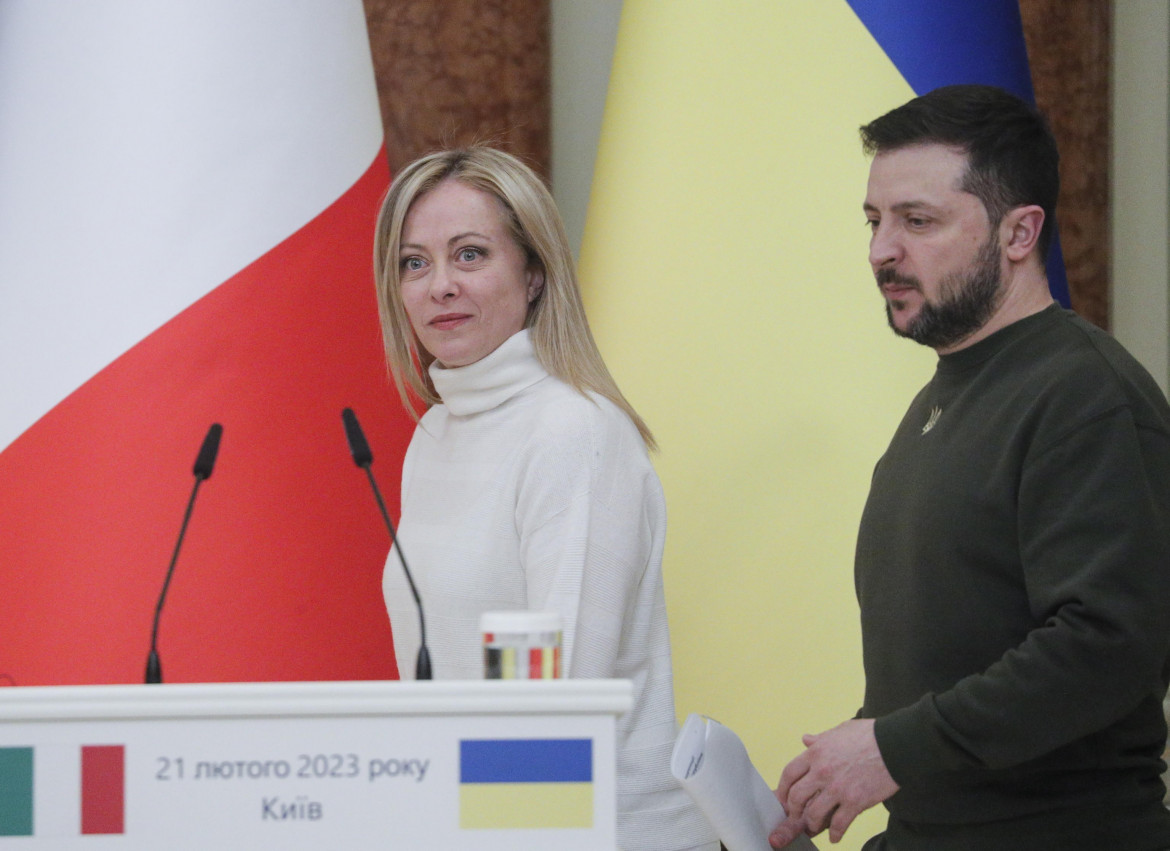Reportage
Meloni visited Bucha and reaffirmed Italy’s commitments in Ukraine
The prime minister flaunted her Atlanticism in a press conference with Zelensky, connecting the war to her ideological themes of ‘homeland’ and ‘cultural identity.’

“Nations are built, above all, on the size of the sacrifices that people are willing to make,” said Italian Prime Minister Giorgia Meloni in her speech at Tuesday’s press conference. In the press room of the Mariinsky Palace in Kyiv, alongside Ukrainian President Volodymyr Zelensky, Meloni did not hesitate to connect the resistance of the Ukrainian armed forces to ideological points; nor did she shy away from tying it all to the Italian Risorgimento.
Speaking of “love for one’s homeland,” of “cultural identity” and stressing that “the Ukrainian people are fighting a battle for each and every one of us,” the Italian premier wanted to dispel any doubts. The Italian government stands by Ukraine until “victory,” or, at least, until a peace that is not “unfair for Ukraine,” because it “cannot be a real peace” otherwise. According to Meloni, a process is taking place in Ukraine that can be likened to the nation-building struggles of nineteenth-century Italy, “when Italy was merely a geographical expression”; today, “with [Ukraine’s] ability to fight, to resist, [it] have proven that [it is] an extraordinary nation.”
It’s only logical that the Italian Prime Minister is reading a context close to her own political history in the current war. Journalists in the room were not allowed to ask questions that had not been vetted in advance, and only four journalists were allowed to question the heads of state.
Half of the questions focused on the thorns in the side of the Italian majority. Berlusconi’s statements and Salvini’s background were mentioned in questions by both Italian and Ukrainian reporters. Moreover, an impromptu episode highlighted the understanding between the two leaders.
As the interpreter’s voice could no longer be heard in the earpieces distributed to everyone in the room, President Zelensky asked a reporter to repeat their question; the reporter repeated it in Italian, and the president asked him to repeat it again. At that point, Meloni herself translated it into English while looking her host in the eye: “Aren’t you afraid that Berlusconi’s statements could be a risk to Italian support for Ukraine?”
The Ukrainian president, after stressing that every political leader had the right to think whatever they wanted, reiterated that it wasn’t such a big deal: “Italy knows that we have the same values, we love life, our children and we respect the territorial integrity of other countries. And that’s the main thing, we speak different languages but we can understand each other.” On Berlusconi’s position, he commented that Berlusconi’s house “has never been bombed by missiles, a Russian tank has never reached him, no one has ever killed his relatives” and he never had to “pack his suitcase at three in the morning to escape […] thanks to Russia’s brotherly love.”
The two leaders were fully in alignment. On more than one occasion, they exchanged cordialities that went beyond protocol, with the Ukrainian president always yielding the floor to her and the Italian premier praising his chivalrousness. Both stressed the importance of Meloni’s visit to Bucha and Irpin.
“It’s always different seeing things with your own eyes,” the premier had said in Bucha, in the courtyard of the local church dedicated to St. Andrew, where mass graves had been discovered last spring and where photos of the massacres found by Ukrainians at the liberation of the town were on display. Meloni was moved when they explained to her that the ground on which they were walking was the same ground from which dozens of corpses had been exhumed.
Due to the very cold and rainy day and her less-than-optimal health (all day long, Meloni coughed conspicuously), the visit was not long. But a Ukrainian war crimes prosecutor summarized the horrors of Bucha for her, the local priest accompanied her to the church to look at the photographic documentation on display there, and the interpreter continued to narrate the main facts of the months of occupation.
Her visit to Irpin was very brief: she was shown a bombed-out building next to which one of the generators donated to Ukrainian civilians by an Italian NGO had been set up, and she exchanged a few words with volunteers from another NGO, “Doctors with Africa CUAMM,” which is providing medical first aid in different parts of the country.
“There’s a difference between reading numbers and instead seeing people’s lives destroyed for no reason,” Meloni told a Ukrainian journalist who had managed to get through the swarm of Italian correspondents and security detail surrounding the prime minister.
Contact between Meloni and the Italian reporters present was minimal to non-existent. The tight schedule, the hour-long train delay in Kyiv and the important meetings in the afternoon did not allow them to press the prime minister more on the thornier issues, such as that of the Italian reporters in Ukraine that have been expelled or suspended.
But in diplomatic visits, as one well knows, the tendency is to avoid controversy. After a blackout that left the press room quiet for a few seconds and after the approved questions were asked, an aide to President Zelensky stepped in to mark the end of this very long day, in which the Italian government’s pro-Atlanticism was reaffirmed more than it had been in quite some time.
Originally published at https://ilmanifesto.it/meloni-a-kiev-tra-patria-e-nazione-insieme-a-voi-fino-alla-vittoria on 2015-10-08
